On June 20, the Ministry of Agriculture and Rural Development (MARD) coordinated with Long An People's Committee to hold a conference to review the prevention and combat against drought, water shortage, saltwater intrusion in the dry season 2019 - 2020 and the directions for sustainable agriculture development in the Mekong River Delta (MRD).
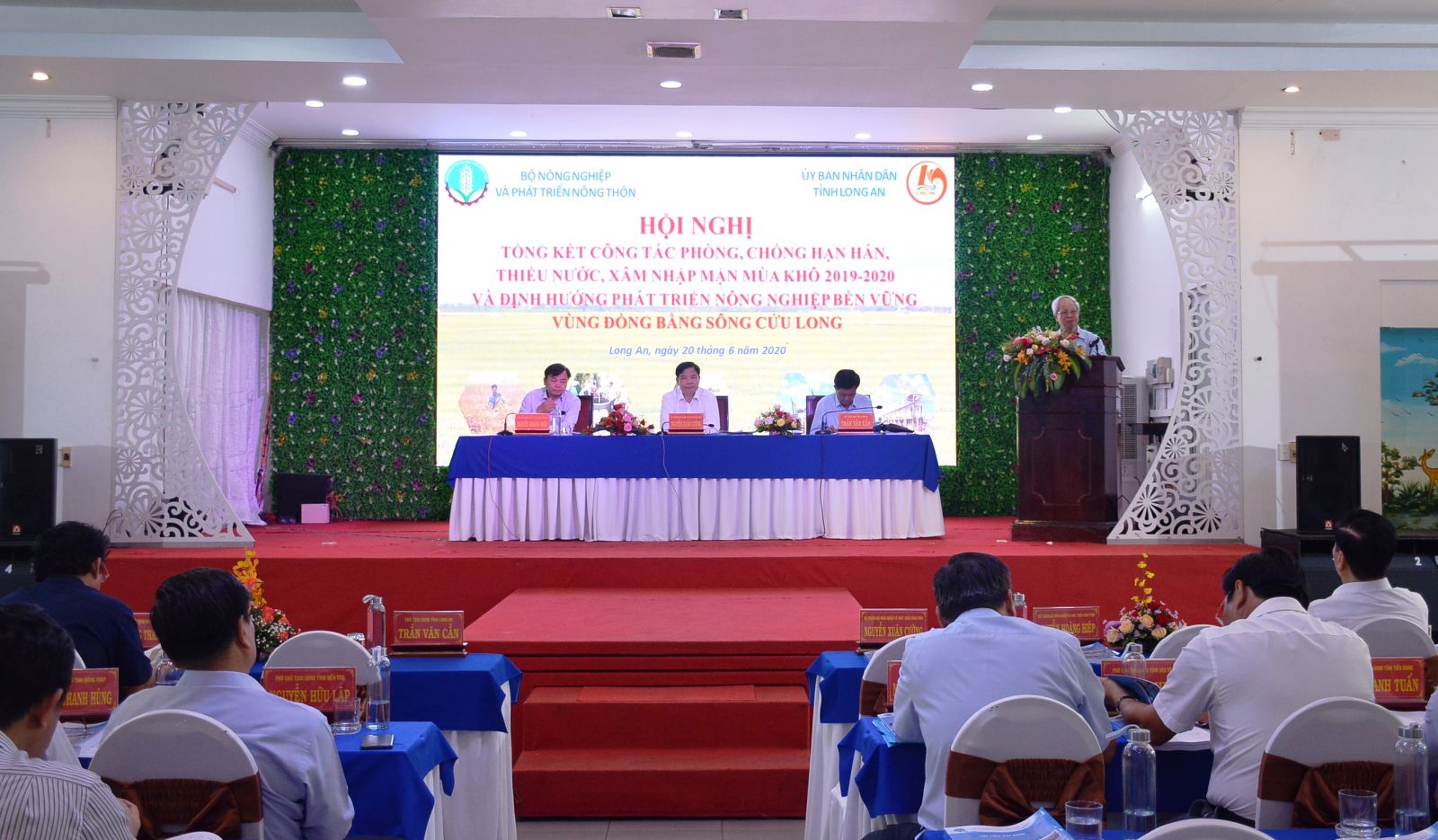
The Ministry of Agriculture and Rural Development coordinates with Long An People's Committee to organize the conference
Minister of Agriculture and Rural Development - Nguyen Xuan Cuong, leaders of ministries and central branches, Chairman of Long An People's Committee - Tran Van Can and representatives of leaders, departments and branches of 13 provinces in the MRD attended the conference.
According to a report by the MARD, the rainy season 2019 in the Mekong basin appeared late compared to many years on average, the total duration of rainfall was short, then low rainfall led to low annual total flow of the MRD. This situation led to saline intrusion in the MRD in the dry season of 2019-2020, occurring early, lasting, severely and continuously maintaining at a high level throughout the dry season, seriously affecting agricultural production and population.
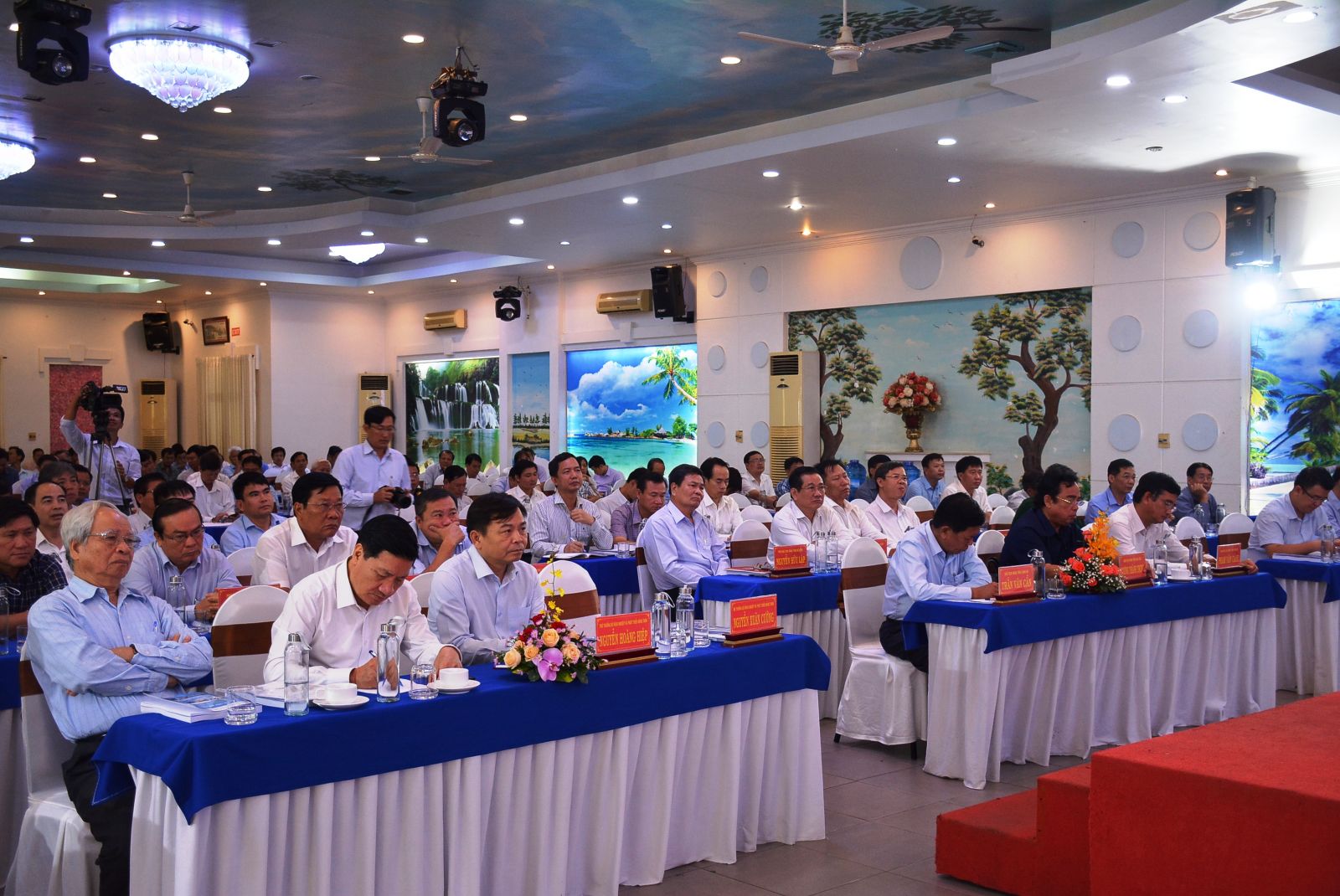
Delegates attend the conference
Through monitoring, saline intrusion in the dry season 2019-2020 has some other characteristics with the rule of many years such as early appearance, earlier than the same period of the average of nearly 3 months, earlier than the dry season 2015-2016 nearly 1 month; saline intrusion time lasts from 2-2.5 times compared to the dry season 2015-2016, salinity in the estuaries of Cua Tieu, Cua Dai and Ham Luong estuaries continues to remain at the top and high continuously from February to May and almost no decrease or negligible reduction in low tide, different from the usual characteristics of increasing with high tide, decreasing with low tide.
Saline intrusion 2019-2020 affects 10 out of 13 provinces in the Mekong Delta. The influence of saline intrusion with a boundary of 4 grams per liter is 1,688,600 hectares, accounting for 42.5 percent of the natural area of the whole region, compared to 50.376 hectares in 2016.
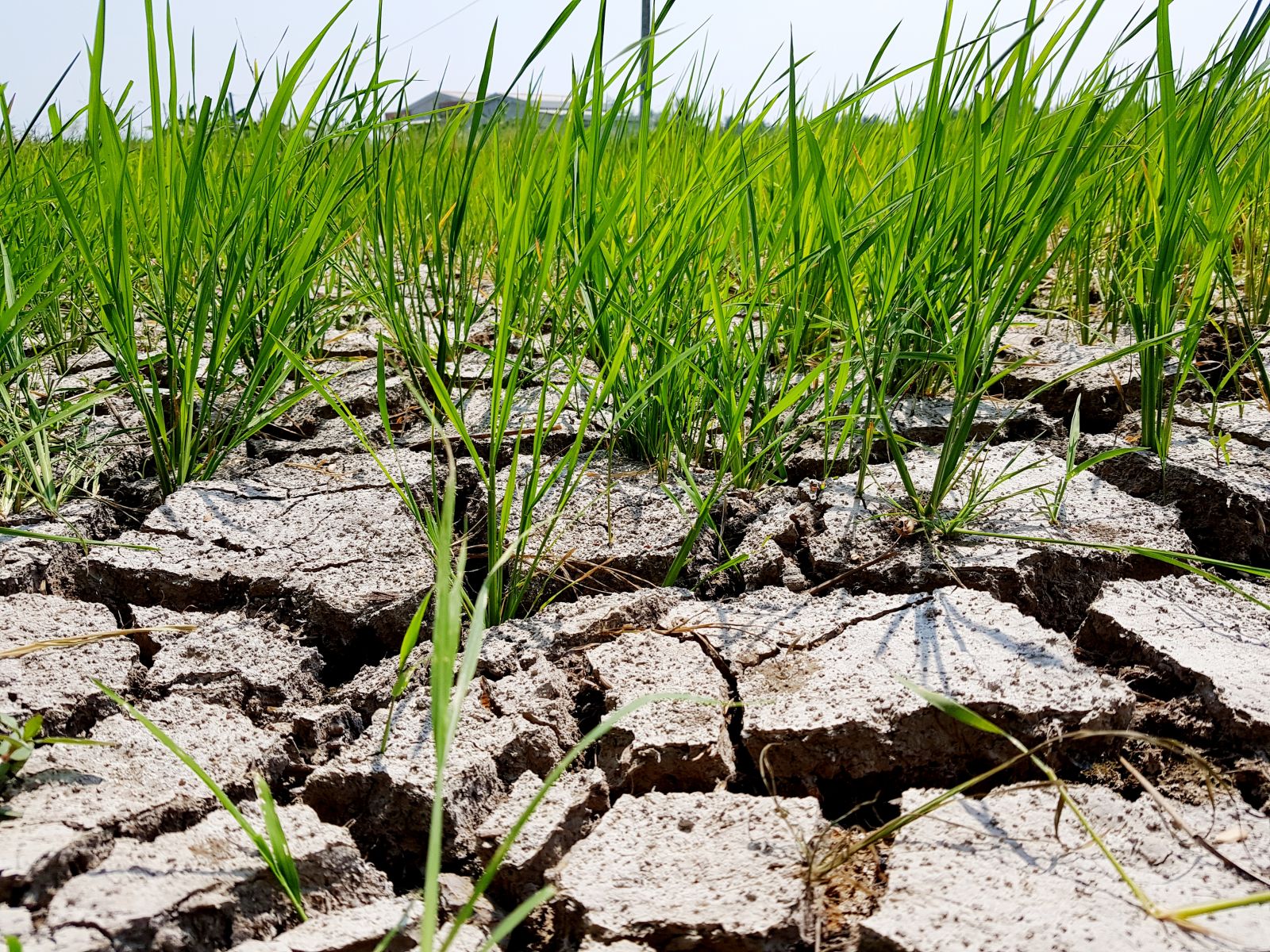
Thousands of hectares of rice fields in the MRD are affected by drought and salinity
The statistics show that the impact of saline intrusion and drought cause severe damage to the agriculture sector. For rice production, the 2019 crop lost 16,500 hectares of rice on shrimp land, mainly in Ca Mau province, of which the area lost 14,000 hectares. The winter-spring crop is affected about 41,900 hectares, of which 26,000 hectares were loss.
For fruit trees, the area of fruit trees affected by drought and saltwater intrusion is about 6,650 hectares, concentrated in provinces such as Long An, Tien Giang, Ben Tre, Vinh Long, Tra Vinh and Soc Trang, among that loss was over 70 percent, about 355 hectares. Particularly for vegetables, the affected area was only about 1,240 hectares.
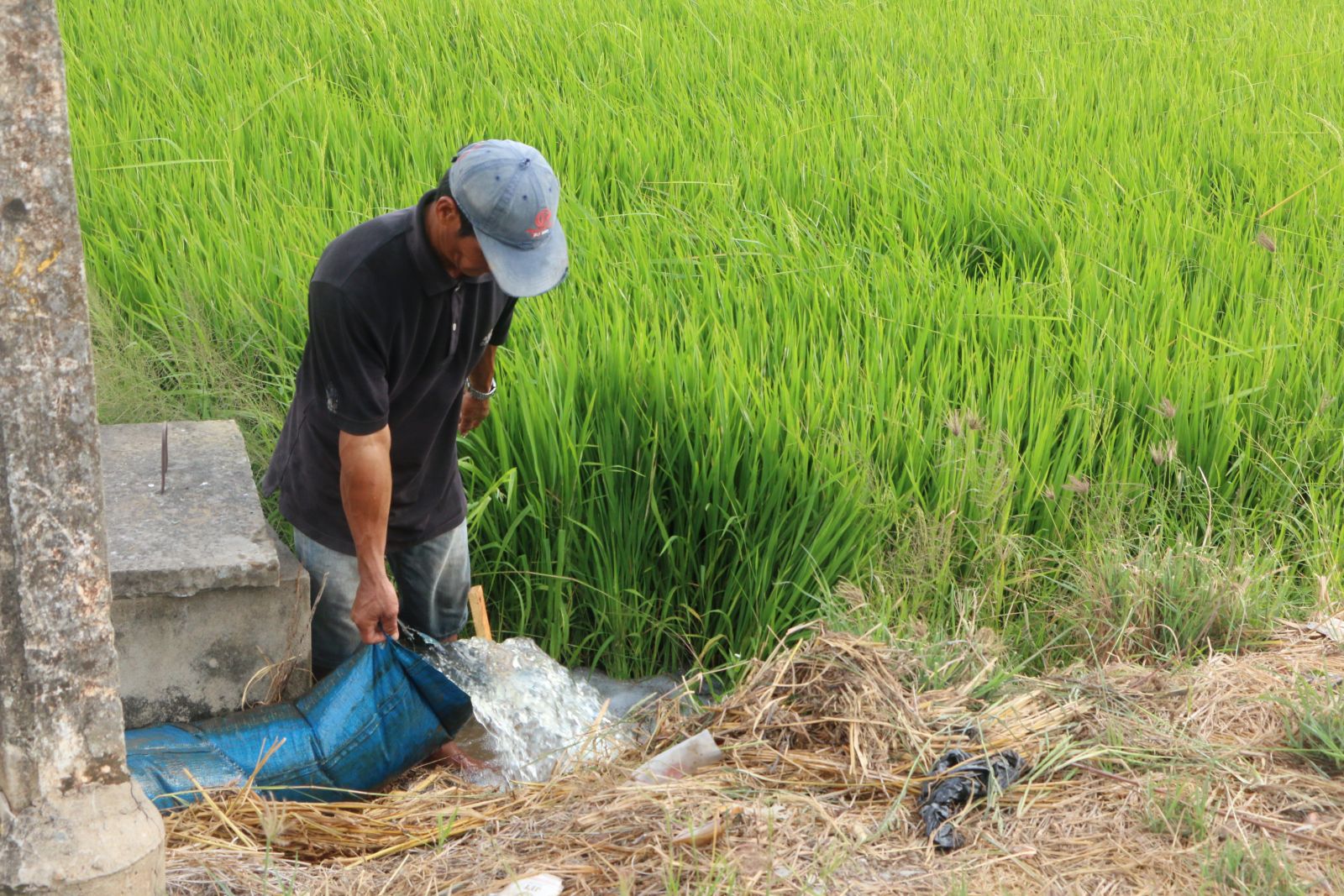
People save rice during the salty drought
In addition to affecting farming, aquaculture is also affected with a total damaged aquaculture area of about 8,715.5 hectares, including 1,234.5 hectares of traditional fish farming, 4,811 hectares of brackish shrimp farming, 136 hectares of catfish farming, 201 hectares of mollusk farming and 2,324 hectares of clam farming.
| In Long An Province, the dry season 2019-2020, saline intrusion began to appear in mid-November 2019, one month earlier than the same period 2018-2019 and half a month earlier than the historical salinity limit 2015 -2016 and it happened harshly, was complicated and unpredictable. Despite early identification of the situation and proactiveness in prevention, response to drought, water shortage, saline intrusion, damage in agricultural production was still unavoidable. According to statistics, in Long An province, about 860 hectaes of rice were lost, 1,900 hectares decreased productivity from 30-70 percent, along with that, many areas of growing lemon in districts of Thu Thua, Tan Tru and Tan An City were damaged by alum, salinity and heat shock. It was estimated total expenditure for damage due to saline drought 2019-2020 in Long An is 55 billion VND, a deep decrease compared to the damage in the historic saltwater year 2015-2016 of 194 billion VND. |
At the same time, drought and saltwater intrusion also directly affect the supply of water for people and lead to landslides. According to statistics from localities, the highest level of lack of domestic water in March 2020 causes about 96,000 households with about 430,000 people lacking domestic water. Although the scope of saline intrusion is higher than that in 2015-2016, the number of households lacking clean water has decreased by about 114,000 households, equivalent to 54 percent compared to 2015-2016. The situation of drought and saltwater intrusion has caused hundreds of landslides in the Mekong Delta provinces. Typically, in the freshwater area in Go Cong, Tien Giang province, there were 112 landslides, with a total length of nearly 16 kilometers; Ca Mau province subsidence 9 provincial roads, subsidence West sea dike section Da Bac - Kenh Moi with a length of 240 meters, the risk of collapse over 4.2 kilometers and subsidence about 25 kilometers of rural roads, etc.
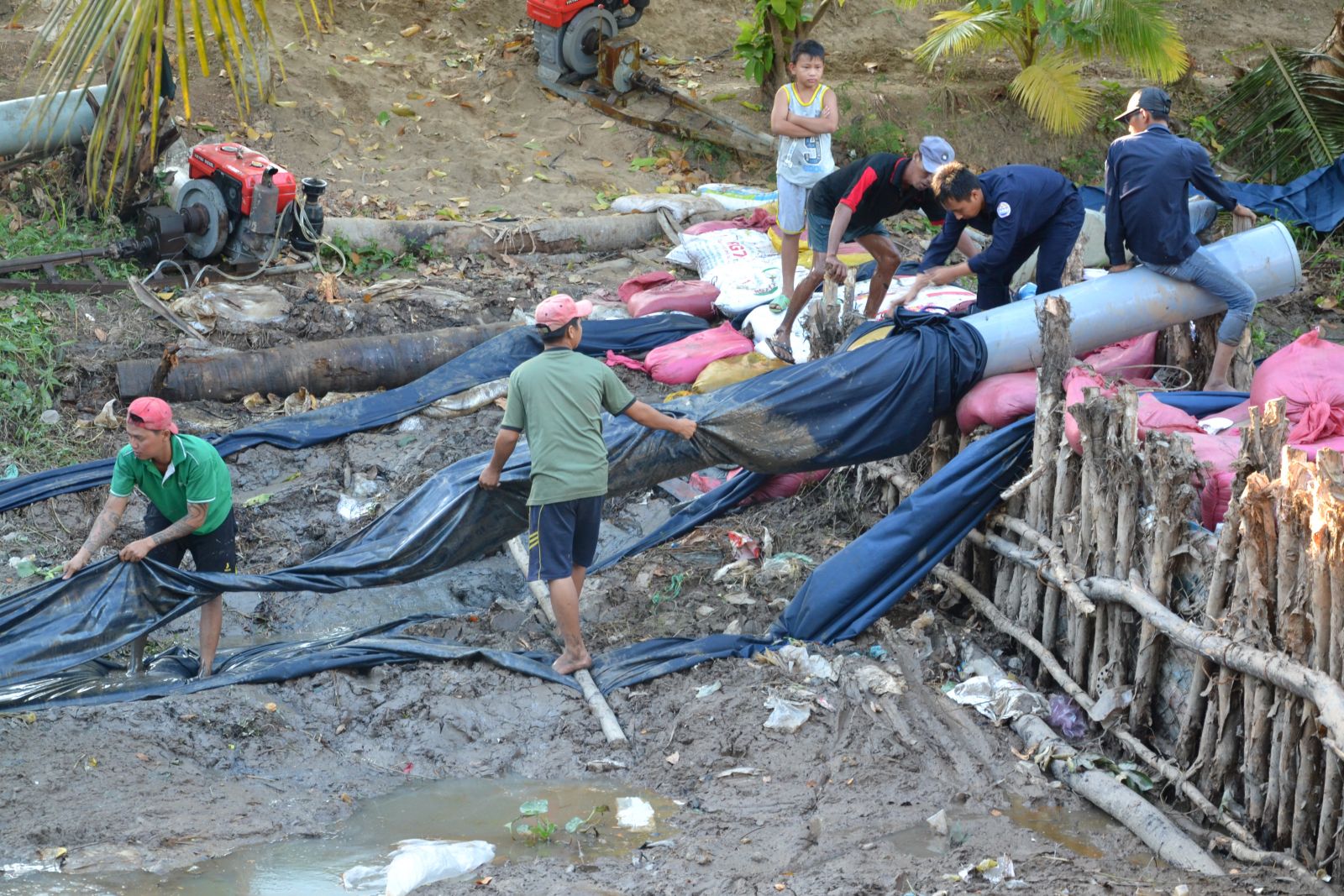
Many canals dry up in the dry season
According to the MARD, saline water intrusion in the dry season 2019-2020 in the Mekong Delta is the most serious in history. However, the degree of damage to agriculture and people's livelihoods is significantly reduced, especially in agricultural production. The results showed that the MARD and the localities promoted the efficiency and proactively responded to drought and saltwater intrusion.
At the conference, the MARD and local leaders and scientists discussed many solutions and lessons from the prevention of drought and saltwater intrusion as well as proposed practical solutions to take initiative in prevention, combat and respond in the coming time in the sustainable development of the Mekong Delta.
Speaking at the conference, Minister of Agriculture and Rural Development - Mr. Nguyen Xuan Cuong affirmed that the situation of drought and saltwater intrusion in the dry season in 2019-2020 was more intense than the historic saltwater in 2015-2016 in terms of time of drought and salinity when affected for 6 months, the saline intrusion is 10-15 percent deeper based on each river basin and impacts on arable land including rice production, fruit trees and people's lives. However, by the overall solution groups, this year, MARD and localities have implemented very early, including early identification, early forecasts to provide synchronized solution groups for construction solutions and solutions groups about reorganizing production.
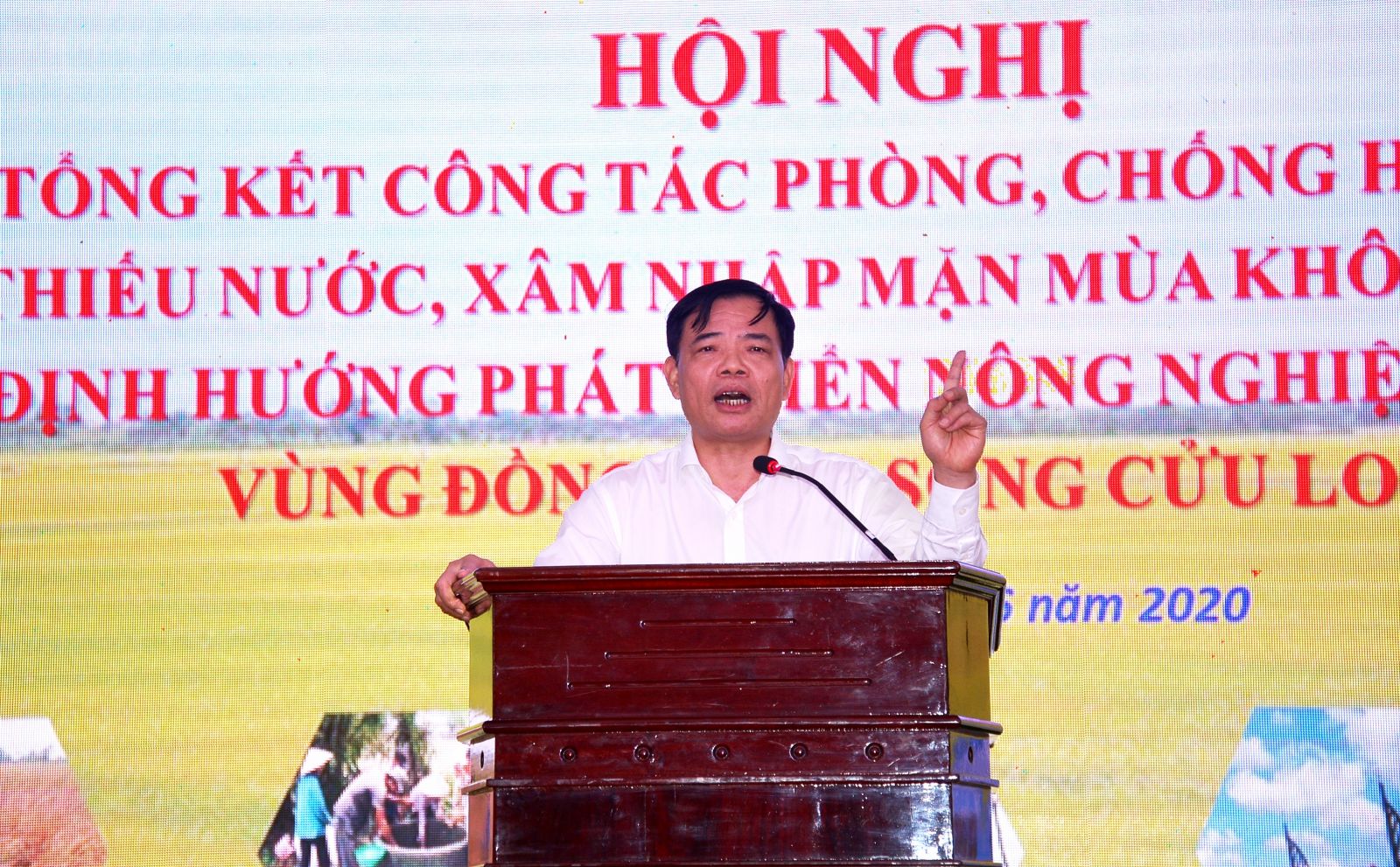
Minister of Agriculture and Rural Development - Nguyen Xuan Cuong speaks at the conference
“Up to now, we can evaluate, we have achieved important results, minimizing the damage caused by salinity drought in agricultural production and livelihoods. Through this, we can draw lessons from practical experience. Firstly, we have identified and forecasted very early, right from September 2019, the Prime Minister deployed a conference to leaders of 13 provinces in the MRD to discuss solutions to actively respond from at the end of 2019. So when it happened, we were very active in responding and adapting in 2020. Secondly, we synchronized the solution groups, especially the structural solutions to control sweetness, inter-regional saline is put into use this year. Thirdly, we have applied biological solutions such as pushing up the winter-spring rice crop, changing crop structure in the drought-stricken areas. But most importantly, we believe that it is the consensus of the entire political system, especially the people who have been conscious, learned from the salt drought 2015-2016, following the recommendations and instructions of specialized agencies to minimize damage caused by saline drought”, Minister of Agriculture and Rural Development - Nguyen Xuan Cuong said.
However, the Minister of Agriculture and Rural Development - Nguyen Xuan Cuong also said that the impacts and challenges from climate change, factors affecting upstream and some other factors will continue to affect vulnerability production and people’s life in the coming time.
“Even the Ministry of Agriculture and Rural Development identifies the scenario of more extreme factors, not the historic drought in 2019-2020, which is the last historical milestone. Therefore, we must be aware, actively adapt, take this as a matter of course, force us to adapt and there is no other way. From there, we must agree, all political systems must join in, the people join in, each locality, district and region must have every practical and specific solution in preventing drought and salinity. Then, the challenges from drought and salinity will be turned into new opportunities. That is to find the most suitable production objects and production methods to not only limit negative impacts but also exploit the advantages and value added by changing the production axis, production structure in the direction of adaptation such as development of fruit trees and fisheries, associated with investment in infrastructure facilities, processing and market organization to ensure sustainable efficiency. This is the final goal we want to aim for in sustainable agricultural development in the Mekong Delta”, emphasized the Minister of Agriculture and Rural Development - Nguyen Xuan Cuong./.
By Kien Dinh – Translated by Duc Tam
Source: http://baolongan.vn/phai-bien-nhung-thach-thuc-tu-han-man-thanh-co-hoi-moi-a97407.html
 Central bank mulls raising gold position limit for lenders
Central bank mulls raising gold position limit for lenders








